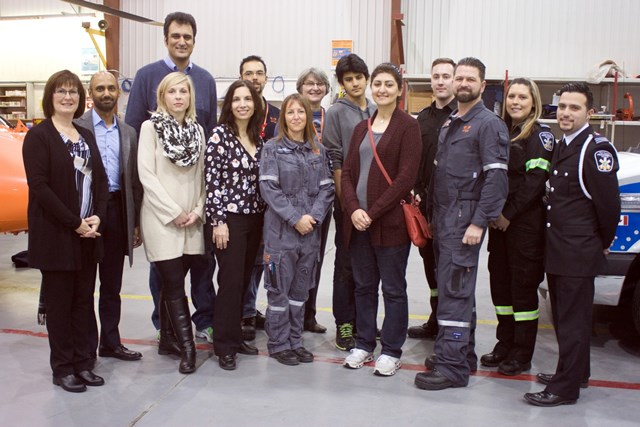If you ask Leila Rahafrouz to tell you her story, she’ll tell you her strongest memory is suffering from a bad bout of the flu. Feeling weak and dizzy, she sent her husband a text message, “come home soon.” Leila’s next memory picks up four weeks later in a recovery room in London Health Sciences Centre’s University Hospital.
“Each day is a gift,” says Leila, an Iranian-born wife and mother. “Enjoy your life today, because you may not be here tomorrow.”
This past March, Leila went to the Milton District Hospital’s Emergency Department with flu-like symptoms. As her health began to rapidly decline, she was admitted to the Intensive Care Unit. An ultrasound revealed a build-up of fluid surrounding Leila’s heart.
Leila was transferred to the Cardiac Care Centre at Trillium Health Partners’ Credit Valley Hospital. There, Cardiologist Dr. Janarthan Nikhil discovered Leila’s condition was worse than expected. Not only was there fluid surrounding Leila’s heart, but her heart muscles were severely weakened – a condition known as myopericarditis. Leila’s heart was barely able to pump blood through her body.
The team of doctors and nurses at Trillium Health Partners worked fast to control the situation as it became apparent that Leila would need extracorporeal membrane oxygenation (ECMO). Essentially, ECMO bypasses the heart and lungs to oxygenate the blood until the heart is well enough to function on its own again. This treatment is only available at Regional Transplant Centres. Calls were placed immediately to get Leila the treatment she was in desperate need of. The closest centre, a hospital in Toronto, could not accommodate Leila’s needs as it had two heart transplants scheduled.
MORE: HEALTH STORIES THAT MADE HEADLINES IN 2014
London’s University Hospital was the next option. The only obstacle was getting Leila there in time. Typically a simple transfer by air ambulance, bad weather forced the Ornge helicopter to stay grounded. Peel Regional Paramedic Services would have to make the journey by ground, with Ornge paramedics and Dr. Nikhil in tow.
“This is a story where there were so many factors working against us,” says Dr. Nikhil. “We had a lot of people invested and working together to support this patient to overcome the dire circumstances. A case like this is extremely rare. We all felt that we needed to do everything possible to give this patient every chance to survive.”
Just 12 minutes into their two-hour journey from Mississauga to London, Leila went into cardiac arrest. Under standard conditions, paramedics would have taken the patient to the closest Emergency Department, which would have meant returning to the Milton District Hospital. The team of health care workers knew Leila’s only chance of survival was to get to University Hospital.
Over the next two hours, EMS workers alternated performing CPR, keeping Leila alive until they reached their destination.
“Leila’s experience shows the difference [CPR] makes,” says Peel Regional Paramedic Services Chief Peter Dundas. “The continuous, good quality chest compressions paramedics delivered kept blood and oxygen flowing well enough so that our hospital health care partners could step in and continue delivering care that ultimately led to a remarkable recovery.”
University Hospital was ready and waiting for Leila’s arrival. ECMO was administered and Leila began her long road to recovery. Leila Rahafrouz knows just how lucky she is with her chances of survival low and odds of brain damage considerably high for the length of time CPR was performed. “I know the result could have been very different,” says Leila. “I cannot find the words to express my gratitude.”
In November, the woman who survived against all odds met and thanked the team of health care professionals that saved her life. At Ornge’s Toronto hangar, Leila said an emotional thank you to the group of nearly 20 paramedics, doctors and nurses who worked tirelessly to keep her alive. Her story is one they will likely never forget.
MORE: THE WORLD IS THEIR ER: ON THE FRONT LINES OF HUMANITARIAN AID
“The health care team involved in Leila’s case is a great example of how collaboration between emergency services can result in a positive outcome. We’re thrilled we were able to contribute alongside such professional and skilled staff,” says Ornge Chief Operating Officer Rob Giguere.
Leila is on her way to making a full recovery, having spent four weeks in a coma state and two months on dialysis to normalize her kidney functions damaged by the ordeal. She has spent the past several months working towards regaining the quality of life she had before her illness. In late November, Leila returned to work as a substitute teacher with the Peel District School Board.
This experience has left two lasting impressions on Leila – the first is to be grateful for your life each and every day. The second is to protect yourself and others from the influenza virus by getting vaccinated.
Viral infections are among the most common causes for myopericarditis and Leila tested positive for influenza. The influenza virus can be serious and deadly. Last year it caused approximately 5,000 hospitalizations and 500 deaths in Canada. The best way to prevent influenza and its spread is by getting the vaccine.
Leila had heard a lot of misinformation about the influenza vaccine and after experiencing such a life-threatening ordeal she urges others to get informed. “Getting the vaccine is safer than getting the flu,” says Leila. “The flu is more than just the sniffles, it can be a matter of life or death. It was for me.”
Health care professionals recommend getting vaccinated early in flu season, however, it is never too late to get vaccinated.




